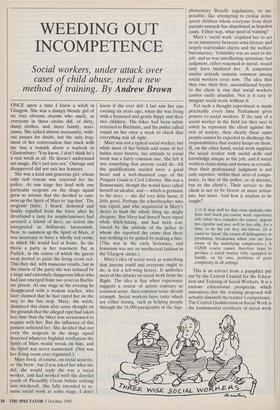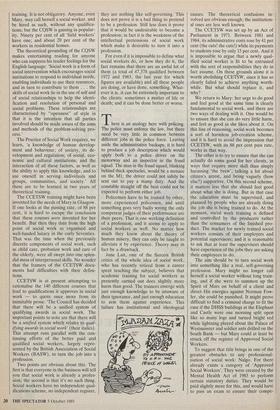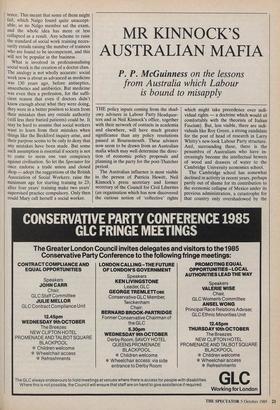WEEDING OUT INCOMPETENCE
Social workers, under attack over cases of child abuse, need a new
ONCE upon a time I knew a witch in Glasgow. She was a dumpy blonde girl of no very obvious charms who smelt, as everyone in those circles did, of dirty, damp clothes, and, more faintly, mari- juana. She talked almost incessantly, with- out pauses for doubt, but the only frag- ment of her conversation that stuck with me was a remark about a warlock in Glastonbury: 'You know, I don't think he's a real witch at all. He doesn't understand sex magic. He's just into sex.' Outrage and disapproval did not suit her features.
She was a kind and generous girl, whose only real venom was reserved for the police. At one stage her feud with one particular sergeant on the drugs squad grew so intense that she decided to sum- mon up the Spirit of Mars to 'zap him'. The sergeant (later, I heard, demoted and finally expelled from the force after he developed a taste for amphetamines) had arrested a friend of hers; an action she interpreted as deliberate harassment. Now, to summon up the Spirit of Mars, it was necessary to have a wholly red room, in which He would feel at home. So she threw a party in her tenement flat in Partick, in the course of which the guests were invited to paint the living room red. This they did, with nauseous results; but in the course of the party she was seduced by a large and extremely dangerous biker who had just emerged from two years in Barlin- nie prison. At one stage in the evening he disappeared with a woman teacher, who later claimed that he had raped her on the way to the bus stop. Mary, the witch, dismissed this claim after some thought on the grounds that the alleged rape had taken less time than the biker was accustomed to require with her. But the influence of this passion softened her. She decided that not even the sergeant in the drugs squad deserved whatever frightful retribution the Spirit of Mars would wreak on him, and the Spirit was never summoned. (Nor was her living room ever repainted.) Mary lived, of course, on social security, or 'the brew', but if you asked her what she did, she would reply she was a social worker, and had worked with the derelict youth of Piccadilly Circus before retiring into witchcraft. She fully intended to re- sume social work at some stage. I don't know if she ever did: I last saw her one evening six years ago, when she was living with a bemused and gentle hippy and their two children. The biker had been safely returned to Barlinnie, and the police called round on her once a week to check that everything was all right.
Mary was not a typical social worker; but while most of her beliefs and some of her habits were bizarre, her attitude to social work was a fairly common one. She felt it was something that anyone could do. All the qualifications needed were a good heart and a well-thumbed copy of the Penguin Guide to Civil Liberties. She was a Rousseauist, though she would have called herself an idealist, and — which is germane to the story — she did very little harm, if little good. Perhaps the schoolteacher who was raped, and who acquiesced in Mary's desire to hush the whole thing up, might disagree. But Mary had herself been raped while hitch-hiking, and had been con- vinced by the attitude of the police to whom she reported the crime that there was nothing to be gained by making a fuss. (This was in the early Seventies, and feminism was not an intellectual fashion in the Glasgow slums.) Mary's idea of social work as something that anyone could and everyone ought to do, is not a left-wing heresy. It underlies most of the attacks on social work from the Right. The idea is that when experience suggests a course of action contrary to common sense, then common sense should triumph. Social workers have tasks which are either boring, such as helping people through the 16,000 paragraphs of the Sup- plementary Benefit regulations, or im- possible, like attempting to civilise delin- quent children whom everyone from their parents onwards has abandoned as hopeless cases. Either way, what need of training?
Mary's 'social work' required her to act as an interpreter between semi-literate and largely inarticulate clients and the welfare bureaucracy. Volubility was an asset in the job, and so was unreflecting optimism; but judgment, either reasoned or moral, would only have hindered her. A somewhat similar attitude remains common among social workers even now. The idea that they owe their first, unconditional loyalty to the client is one that social workers cannot easily abandon. Nor is it easy to imagine social work without it.
Yet such a thought experiment is made practically every time Parliament gives powers to social workers. If the task of a social worker in the field (as they say) is solely to represent the client against the rest of society, then clearly these same people cannot be expected to discharge the responsibilities that society heaps on them. lf, on the other hand, social work supplies the social worker with useful skills and knowledge unique to the job, and if social workers claim status and money as a result, then their professional judgment is not only superior, within their area of compe- tence, to that of the police, or of doctors, but to the client's. Their service to the client is not to be braver or more articu- late, but wiser. And how is wisdom to be taught?
3.11 It may well be that even students who have had much pre-course work experience will, when they complete the course, appear less capable and may well be less able, for a time, to do the job they did before. (It is easier to 'know' the causes of delinquency or pyschiatric breakdown when you are less aware of the underlying complexities.) A CQSW course cannot therefore hope to produce a social worker fully equipped to handle, on his own, problems of great complexity in all settings.
This is an extract from a pamphlet put out by the Central Council for the Educa- tion and Training of Social Workers. It is a curious educational prospectus which announces that the training proposed will actually diminish the trainee's competence. The Central Qualification in Social Work is the fundamental certificate of social work training. It is not obligatory. Anyone, even Mary, may call herself a social worker, and be hired as such, without any qualifica- tions; but the CQSW is gaining in popular- ity. Ninety per cent of all 'field workers' have one; and about 20 per cent of the workers in residential homes.
The theoretical grounding of the CQSW makes entertaining reading for anyone who can suppress his tender feelings for the English language: 'Social work is a form of social intervention which encourages social institutions to respond to individual needs, enabling individuals to use their resources, and in turn to contribute to them . . . the skills of social work lie in the use of self and of social relationships to help the identi- fication and resolution of personal and social problems. These relationships are characterised by "openness" of style in that it is the intention that all parties involved should be made aware of the aims and methods of the problem-solving pro- cess.'
The Practice of Social Work requires, we learn, 'a knowledge of human develop- ment and behaviour; of society, its de- velopment and regulation; of social, eco- nomic and cultural institutions; and the interaction of all these factors, as well as the ability to apply this knowledge, and to use oneself in serving individuals and groups, communities, and society.' All these are to be learned in two years of theoretical training.
The CCETSW training might have been invented for the needs of Mary in Glasgow. If one looks at the passing rate, of 88 per cent, it is hard to escape the conclusion that these courses were invented for her benefit. But then they date from the high point of social work as organised and well-funded lunacy in the early Seventies. That was the time when the previously discrete components of social work, such as child care, probation work and care of the elderly, were all swept into one splen- did mess of interpersonal skills. No wonder that the framers of the CCETSW docu- ments had difficulties with their defini- tions.
CCETSW is at present attempting to rationalise the 140 different courses that lead to qualifications it approves in social work — to quote once more from its inimitable prose: The Council has decided that there will be a unified system of qualifying awards in social work. The important points to note are that there will be a unified system which relates to qual- ifying awards in social work' (their italics). This attempt runs parallel with the con- tinuing efforts of the better paid and qualified social workers, largely repre- sented by the British Association of Social Workers (BASW), to turn the job into a profession.
Two points are obvious about this. The first is that everyone in the business will tell you that social work is already a profes- sion; the second is that it's no such thing. Social workers have no independent qual- ifications scheme, no independent register, they are nothing like self-governing. This does not prove it is a bad thing to pretend to be a profession. Still less does it prove that it would be undesirable to become a profession; in fact it is the weakness of the intellectual pretensions of social work which make it desirable to turn it into a profession.
For even if it is impossible to define what social workers do, or how they do it, the fact remains that there are an awful lot of them (a total of 47,578 qualified between 1972 and 1983, the last year for which figures are available) and all these people are doing, or have done, something. What- ever it is, it can be extremely important to the clients: sometimes a matter of life or death; and it can be done better or worse.
There is an analogy here with policing. The police must enforce the law, but there need be very little in common between different jobs in the police force. Leaving aside the administrative backups, it is hard to produce a job description which would apply both to a police driver on the motorway and an inspector in the fraud squad. The man in the fraud squad, blinking behind thick spectacles, would be a menace on the Ml; the driver could not safely be sent out to pay a stamp duty. And the constable straight off the beat could not be expected to perform either job.
Policemen have to be trained by other, more experienced policemen, and until something goes very badly wrong the only competent judges of their performance are their peers. That is one working definition of a profession, and it seems to apply to social workers as well. No matter how much they know about the theory of human misery, they can only be taught to alleviate it by experience. Theory may in fact be a drawback.
June Lait, one of the fiercest British critics of the whole idea of social work, who has recently retired from a career spent teaching the subject, believes that academic training for social workers as presently carried out does slightly more harm than good. The trainees emerge with just enough knowledge to be unaware of their ignorance, and just enough education to arm them against experience. This failure has institutional and ideological causes. The theoretical confusions in- volved are obvious enough; the institution- al ones are less well known.
The CCETSW was set up by an Act of Parliament in 1971. Between 1981 and 1984, its administrative costs rose by 41 per cent (the cuts! the cuts!) while its payments to students rose by only 15 per cent. And it is impossible to argue that a newly qual- ified social worker is fit to be entrusted with the sort of responsibilities they do in fact assume. On these grounds alone it is worth abolishing CCETSW, since it has so clearly failed to achieve anything worth- while. But what should replace it, and why?
We return to Mary: her urge to do good and feel good at the same time is clearly fundamental to social work, and there are two ways of dealing with it. One would be to ensure that she can do very little harm, and feel as good as she likes about it. On this line of reasoning, social work becomes a sort of harmless job-creation scheme, and it is hard to avoid the impression that CCETSW, with its 88 per cent pass rate, works in that way.
The other is to try to ensure that she can actually do some good for her clients, in ways that require more skill than simply harassing 'the brew', talking a lot about citizen's arrest, and being vaguely (how else?) supportive. On this second scheme, it matters less that she should feel good about what she is doing. But in that case the education must be supervised, and planned by people who are already doing the job she is being trained to do. At the moment, social work training is defined and controlled by the producers rather than the consumers of the finished pro- duct. The market for newly trained social workers consists of their employers and potential supervisors; and it is reasonable to ask that at least the supervisors should have experience of the jobs they are asking their employees to do.
The aim should be to turn social work into something like a real, self-governing profession. Mary might no longer call herself a social worker without long train- ing, and if she were to summon up the Spirit of Mars on behalf of a client and direct His energies against Norman Fow- ler, she could be punished. It might prove difficult to find a criminal charge to fit the case if the DHSS buildings at the Elephant and Castle were one morning split open like so many logs and turned bright red while lightning played about the Palace of Westminster and soldier ants drilled on the South Bank — but Mary could at least be struck off the register of Approved Social Workers.
To suggest that title brings in one of the greatest obstacles to any professional- isation of social work: Nalgo. For there already exists a category of 'Approved Social Workers', They were created by the Mental Health Act of 1983 to perform certain statutory duties. They would be paid slightly more for this, and would have to pass an exam to ensure their compe- tence. This meant that some of them might fail, which Nalgo found quite unaccept- able; so no Nalgo member sat the exam, and the whole idea has more or less collapsed as a result. Any scheme to raise the standard of social work training neces- sarily entails raising the number of trainees who are found to be incompetent, and this will not be popular in the business.
What is involved in professionalising social work is the creation of a doctor class. The analogy is not wholly accurate: social work now is about as advanced as medicine was 130 years ago, before antiseptics, anaesthetics and antibiotics. But medicine was even then a profession, for the suffi- cient reason that even if doctors didn't know enough about what they were doing, they were in a better position to learn from their mistakes than any outside authority (still less their buried patients) could be. It may be hard to assume that social workers want to learn from their mistakes when things like the Beckford inquiry arise, and their purpose seems to be only to deny that any mistakes have been made. But some such assumption is essential if society is not to come to seem one vast conspiracy against civilisation. So let the Spectator for once endorse a trade union and closed shop — adopt the suggestions of the British Association of Social Workers: raise the minimum age for starting training to 23; after four years' training make two years' supervised practice compulsory. Only then could Mary call herself a social worker.




























































 Previous page
Previous page